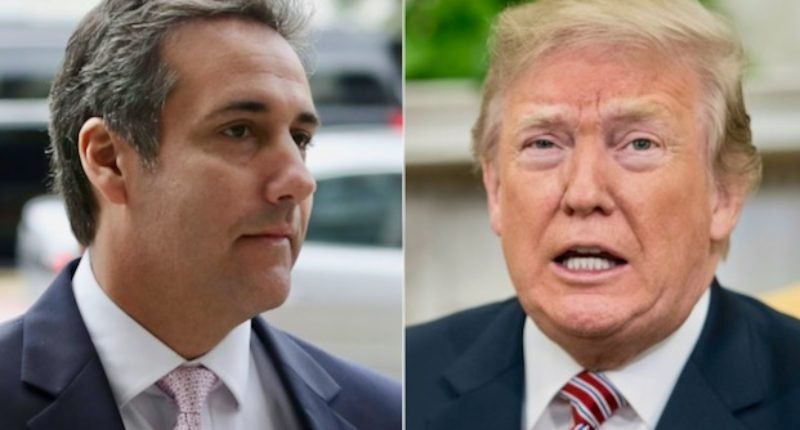Michael Cohen has spoken out about Donald Trump's weaponization of the Justice Department in his most recent book, on his podcast and in interviews.
But speaking to MSNBC on Sunday, his lawyer Lanny Davis, opened with his complaint of how unorthodox and unethical it was for the Southern District of New York to give Cohen 48 hours to plead guilty to every crime they told him to or they'd go after his wife. To be clear, Cohen's wife has never done anything wrong and has never been accused of doing anything wrong, such less been involved in Trump matters.
"We know from the public record that Trump has a penchant for putting for attempting to interfere in investigations that pose a threat to him," MSNBC host Ayman Mohyeldin said. "We know that Trump has a penchant for putting pressure on the Southern District of New York. After all, Trump's first attorney general, Jeff Sessions, fired then-U.S. Attorney Preet Bharara from his role overseeing the Souther District after he refused a request to resign. Months later, Bharara said that he believed that if he had stayed, Donald Trump would have asked him, 'to do something inappropriate.' Years later, the Trump appointee to oversee the Southern District of New York, Jeffrey Berman, released a book [and] in that book, he alleged that Trump sought to use the U.S. Attorney's Office to support Trump politically and pursue his critics, even pushing the office to open a criminal investigation of former Secretary of State John Kerry."
It's hard to connect the dots, but it's something that goes along with what Cohen and Davis are alleging, said Mohyeldin.
"He makes very important points here first of all," Trump biographer David Cay Johnston said of Davis' allegations. "Under Trump, the Justice Department wasn't the U.S. Justice Department, it was the Trump Justice Department. We saw Bill Barr engaging in all sorts of behaviors and having subordinates do them that are just not appropriate for the Justice Department. So, I think there is a very valid point that he has made here about how his client, Michael Cohen, was treated. I thought in this segment, he pointed out very well that prosecutors used people who have committed multiple murders, commercial murders, in order to make cases. This case, I have said repeatedly, will not be a single string. It will be a fabric of interconnected crimes that they're going to weave together for the jury."
When asked about the comments from Davis, a former prosecutor from special counsel Robert Mueller's team, Andrew Weissmann, explained that it is typical for state prosecutors and federal prosecutors to have "turf disputes." Meaning, the last thing that they want is two different offices investigating someone for the same crime.
"There's enough crime to go around," Weissmann quipped.
"What was more interesting was that the Southern District was apparently told by the then-attorney general to stop after taking a plea from one participant in the conspiracy because the other conspirator was Donald Trump," he continued. "The reports are that you had the attorney general of the United States saying, do not continue any investigation which is permissible under the DOJ rules. I worked on the Mueller investigation, all of that was very much an investigation into the conduct of the president of the United States. The only thing you couldn't do under DOJ policy is actually charge the president. But you could investigate. So, I thought that was the very interesting part that there was a stand down from the attorney general to the Southern District of New York, and then apparently the southern district then booted it back to the DA's office, which is why we are in the position where we are in now this is a state case, not a federal case."
The interesting piece about the case being a state case is that under the pardon rules, Trump could never pardon himself or be pardoned by a president for the charges in New York. So, by the Trump DOJ forcing the case back to New York instead of the SDNY, Trump's DOJ actually made things worse for Trump.
Where it could work to Trump's benefit, Weissmann explained, is that Cohen and Davis say that it wasn't their crime, that it was shoved down his throat. Weissmann said that Trump could use that to his benefit to say Cohen doesn't believe that he was guilty of the crime.
The piece of it that Cohen was talking about that he was forced to plead guilty to is that he was involved in the hush money payments to Karen McDougal when that money never came from Cohen, but from the National Enquirer's David Pecker. Cohen has also been accused of taking out a home equity line of credit (HELOC) to pay for the hush money payments. Cohen disputes that too, telling MSNBC's Nicolle Wallace and Ari Melber last week that he already had his HELOC loan well before the Stormy Daniels case became an issue and that it had nothing to do with that case. So, for him to be accused of bank fraud and other related charges, it is false.
In Trump's case, however, while no one has seen the charges, what will likely be cited in the case is that Trump created false business records around the hush money payments to hide them.
See the three videos below, Lanny Davis' interview, David Cay Johnston and Andrew Weissmann's.
You can also see them at the link here.
Leave a Comment
Related Post
